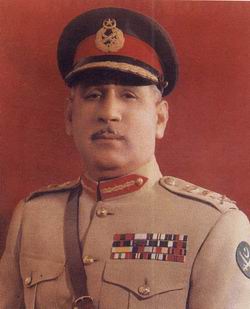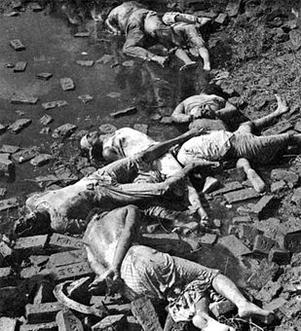
East Pakistan was the eastern provincial exclave of Pakistan between 1955 and 1971, covering the territory of the modern country Bangladesh. The province was restructured and renamed from East Bengal, which, in modern times, is split between India and Bangladesh. Its land borders were with India and Burma, with a coastline on the Bay of Bengal. East Pakistanis were popularly known as "Pakistani Bengalis"; to distinguish this region from India's state West Bengal, East Pakistan was known as "Pakistani Bengal". In 1971, East Pakistan became the newly independent state Bangladesh, which means "country of Bengal" or "country of Bengalis" in Bengali language.

Agha Muhammad Yahya Khan was a Pakistani military officer, who served as the third president of Pakistan from 1969 to 1971. He also served as the Commander-in-Chief of the Pakistan Army from 1966 to 1971. Along with Tikka Khan, he was considered the chief architect of the 1971 Bangladesh genocide.

Sheikh Mujibur Rahman, popularly known by the honorific prefix Bangabandhu was a Bangladeshi politician, revolutionary, statesman, activist and diarist. As a politician, Mujib had held continuous positions as president or prime minister from April 1971 until his assassination in August 1975: as president from 1971 to 1972 and briefly from 1975 until his death, and as prime minister from 1972 to 1975. Mujib successfully led the Bangladeshi independence movement and restored the Bengali sovereignty after over two centuries following the Battle of Plassey in 1757, for which he is honoured as the 'Father of the Nation' in Bangladesh. In 2011, the fifteenth constitutional amendment in Bangladesh referred to Sheikh Mujib as the Father of the Nation who declared independence; these references were enshrined in the fifth, sixth, and seventh schedules of the constitution. His Bengali nationalist ideology, socio-political theories, and political doctrines are sometimes called Mujibism.

Zulfikar Ali Bhutto was a Pakistani barrister, politician, and statesman. He served as the fourth president of Pakistan from 1971 to 1973 and later as the ninth prime minister of Pakistan from 1973 to 1977. Bhutto founded the Pakistan People's Party (PPP) and served as its chairman until his execution.

The Indo-Pakistani war of 1971, also known as the third India-Pakistan war, was a military confrontation between India and Pakistan that occurred during the Bangladesh Liberation War in East Pakistan from 3 December 1971 until the Pakistani capitulation in Dhaka on 16 December 1971. The war began with Pakistan's Operation Chengiz Khan, consisting of preemptive aerial strikes on eight Indian air stations. The strikes led to India declaring war on Pakistan, marking their entry into the war for East Pakistan's independence, on the side of Bengali nationalist forces. India's entry expanded the existing conflict with Indian and Pakistani forces engaging on both the eastern and western fronts. Thirteen days after the war started, India achieved a clear upper hand, and the Eastern Command of the Pakistan military signed the instrument of surrender on 16 December 1971 in Dhaka, marking the formation of East Pakistan as the new nation of Bangladesh. Approximately 93,000 Pakistani servicemen were taken prisoner by the Indian Army, which included 79,676 to 81,000 uniformed personnel of the Pakistan Armed Forces, including some Bengali soldiers who had remained loyal to Pakistan. The remaining 10,324 to 12,500 prisoners were civilians, either family members of the military personnel or collaborators (Razakars).

Nurul Amin was a Pakistani politician and jurist who served as the eighth prime minister of Pakistan from 7 December to 20 December 1971. His term of only 13 days as prime minister was the shortest served in Pakistani parliamentary history. He was also the only vice president of Pakistan.

The Bangladesh Liberation War, also known as the Bangladesh War of Independence, or simply the Liberation War in Bangladesh, was a revolution and armed conflict sparked by the rise of the Bengali nationalist and self-determination movement in East Pakistan, which resulted in the independence of Bangladesh. The war began when the Pakistani military junta based in West Pakistan—under the orders of Yahya Khan—launched Operation Searchlight against the people of East Pakistan on the night of 25 March 1971, initiating the Bangladesh genocide.

The Simla Agreement, also spelled Shimla Agreement, was a peace treaty signed between India and Pakistan on 2 July 1972 in Shimla, the capital city of the Indian state of Himachal Pradesh. It followed the Indo-Pakistani War of 1971, which began after India intervened in East Pakistan as an ally of Bengali rebels who were fighting against Pakistani state forces in the Bangladesh Liberation War. The Indian intervention proved decisive in the war and led to East Pakistan's breakaway from its union with West Pakistan and the emergence of the independent state of Bangladesh.

Brigadier Siddique Salik, SI(M), was an officer in the Pakistan Army, combat artist, humorist, novelist, and a memoirist who served as 8th Director-General of the Inter-Services Public Relations from 1985 until his death in 1988 in the plane crash in Bahawalpur with then President. In addition, he also authored two eyewitnessed books on the Bangladesh Liberation War which took place in erstwhile East-Pakistan, giving accounts of politics and the barbaric strategies used by the military.

Tikka Khan was a Pakistani military officer who served as the first chief of the army staff from 1972 to 1976. Along with Yahya Khan, he is considered a chief architect of the 1971 Bangladesh genocide which according to independent researchers led to the deaths of 300,000 to 500,000 people.

Lieutenant General Amir Abdullah Khan Niazi was a Pakistani military officer. During the Bangladesh Liberation War and the Indo-Pakistani War of 1971, he commanded the Pakistani Eastern Command in East Pakistan, he signed the instrument of surrender as in 16 Dec. '71 his forces had to surrender to the Indian Army's Eastern Command's commander Lieutenant General Jagjit Singh Aurora by the order of the then President of Pakistan Yahya Khan.

The Bangladesh genocide was the ethnic cleansing of Bengalis, especially Bengali Hindus, residing in East Pakistan during the Bangladesh Liberation War, perpetrated by the Pakistan Armed Forces and the Razakars. It began on 25 March 1971, as Operation Searchlight was launched by West Pakistan to militarily subdue the Bengali population of East Pakistan; the Bengalis comprised the demographic majority and had been calling for independence from the Pakistani state. Seeking to curtail the Bengali self-determination movement, erstwhile Pakistani president Yahya Khan approved a large-scale military deployment, and in the nine-month-long conflict that ensued, Pakistani soldiers and local pro-Pakistan militias killed between 300,000 and 3,000,000 Bengalis and raped between 200,000 and 400,000 Bengali women in a systematic campaign of mass murder and genocidal sexual violence. In their investigation of the genocide, the Geneva-based International Commission of Jurists concluded that Pakistan's campaign involved the attempt to exterminate or forcibly remove a significant portion of the country's Hindu populace.

The Pakistani Instrument of Surrender was a legal document signed between India and Pakistan to end the Bangladesh Liberation War and the Indo-Pakistani War of 1971. Per the trilateral agreement, the Pakistani government surrendered the Armed Forces Eastern Command, thereby enabling the establishment of the People's Republic of Bangladesh over the territory of East Pakistan. The document was signed by Jagjit Singh Aurora and Pakistan's A. A. K. Niazi, who corroborated the surrender of 93,000 Pakistani soldiers — the world's largest surrender in terms of number of personnel since World War II. Despite the agreement, Pakistan did not formally recognize Bangladeshi sovereignty until February 1974.

Stranded Pakistanis in Bangladesh are Bihari Muslim migrants with homelands in present-day India who settled in East Pakistan following the partition of India in 1947.

The Hamoodur Rahman Commission, was a judicial inquiry commission that assessed Pakistan's political–military involvement in East-Pakistan from 1947 to 1971. The commission was set up on 26 December 1971 by the government of Pakistan and chaired under Chief Justice Hamoodur Rahman.
1973 (MCMLXXIII) was a common year starting on Monday of the Gregorian calendar, the 1973rd year of the Common Era (CE) and Anno Domini (AD) designations, the 973rd year of the 2nd millennium, the 73rd year of the 20th century, and the 4th year of the 1970s decade.

Pakistan and Bangladesh are both South Asian Muslim-majority countries. Following the end of British rule in India, the two countries formed a single state for 24 years. The Bangladesh Liberation War in 1971 resulted in the secession of East Pakistan as the People's Republic of Bangladesh. Pakistan recognized Bangladesh in 1974 after pressure from across the world. Today, bilateral relations between Bangladesh and Pakistan are considered to be cordial.
The "Bihari" minority in Bangladesh were subject to persecution during and after the 1971 Bangladesh Liberation War, experiencing widespread discrimination. Biharis were ethnic Urdu-speakers and largely maintained a pro-Pakistani stance, supported the Pakistan Armed Forces and opposed the independence of Bangladesh and the Bengali language movement of the Bengali Muslims. Biharis faced reprisals from Mukti Bahini and militias resulting in an estimated death toll ranging from 1,000 to 150,000.

The Pakistani prisoners of war during the Indo-Pakistani war of 1971 were the servicemen deployed in the Eastern Command of the Pakistan armed forces who were held in by the Indian Army.
The Bangladesh Liberation War was a revolutionary independence war that took place in South Asia in 1971; this event resulted in the establishment of the republic of Bangladesh. The war pitted East Pakistan against West Pakistan and lasted over a duration of nine months. It witnessed large-scale atrocities, the exodus of 10 million refugees and the indiscriminate killing of 3 million people.
















